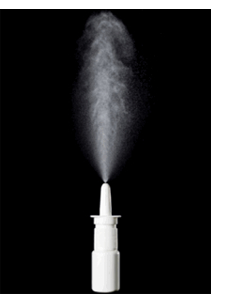Parenting Archive
Delaying Alzheimer's with a Spray of Insulin up the Nose
 Alzheimer's is a disease that causes a progressive decline in brain functioning and typically affects people over the age of 65. Common symptoms are memory loss, difficulty completing familiar tasks, confusion, problems communicating, misplacing things, decreased judgment, and changes in mood and personality. Over 5 million Americans and an estimated 35 million people worldwide have Alzheimer’s. Currently, there are no known ways to prevent or delay the progression of Alzheimer's disease.
Alzheimer's is a disease that causes a progressive decline in brain functioning and typically affects people over the age of 65. Common symptoms are memory loss, difficulty completing familiar tasks, confusion, problems communicating, misplacing things, decreased judgment, and changes in mood and personality. Over 5 million Americans and an estimated 35 million people worldwide have Alzheimer’s. Currently, there are no known ways to prevent or delay the progression of Alzheimer's disease. Insulin plays an important role in the functioning of a normal brain and facilitates memory. Researchers have suspected a potential link between Alzheimer’s and insulin for several years—noting lower levels of insulin and insulin activity in the brains of Alzheimer’s patients. However, this is the first study that has shown that spraying insulin into the nose may work as a treatment for Alzheimer’s.
The new study was conducted by researchers at University of Washington and published in the online edition of the Archives of Neurology. Subjects were divided into three groups. The first group received 20 international units of insulin per day. The second group received 40 units of insulin a day, while the third group received a placebo (no insulin). Both groups of people who received intranasal insulin twice a day either improved slightly or remained the same in memory tests and assessments of their ability to handle day-to-day activities. Those who received the placebo rather than insulin got worse.
A subgroup of these individuals also had brain scans conducted to determine the use of glucose by their brain. Individuals with Alzheimer's typically show reduced metabolism in the brain characterized by less use of glucose, which fuels brain cells. In this study, individuals receiving insulin used more glucose in their brains, while those receiving placebos used less. According to Dr. Suzanne Craft, the lead investigator of the study, brain cells need insulin. People with conditions where the body makes too little insulin or is resistant to insulin (for example, diabetes or untreated high blood pressure) have an increased risk of Alzheimer's disease.
Another piece of the puzzle, according to Dr. Craft is that beta amyloid, a toxic protein that accumulates in the brain of Alzheimer's patients and seems to inhibit insulin in the brain. That observation led Dr. Craft to wonder if more insulin could be put into the brains of people with the Alzheimer's whether their memories and ability to function might improve. One obstacle was a suitable delivery method for getting more insulin to the brain, but not into the body. The solution is a device that delivers a spray of insulin deep into the nose where it travels along a nerve pathway that leads right into the brain.
In previous research, the investigators gave some patients a single dose of insulin delivered using a nasal spray and found that their memories improved temporarily. Following that, they tried giving insulin daily for three weeks. That also seemed to help, and laid the foundation for the current four-month study.
Despite these promising findings, caution is warranted. First, these are very preliminary findings from a small pilot study involving only 104 people. A larger, longer study is needed to confirm these findings. Second, a recent review of all of the published evidence on the prevention and treatment of Alzheimer's found little evidence that anything worked. Nonetheless, this is an import new study providing encouraging results that may one day lead to an effective treatment for this debilitating disease.
Sources: New York Times (9-13-11), Archives of Neurology (9-12-11, online edition), Mayo Clinic Online
Past Articles:
How To Have a Safe (and Happy) Halloween!Delaying Alzheimer's with a Spray of Insulin up the Nose



